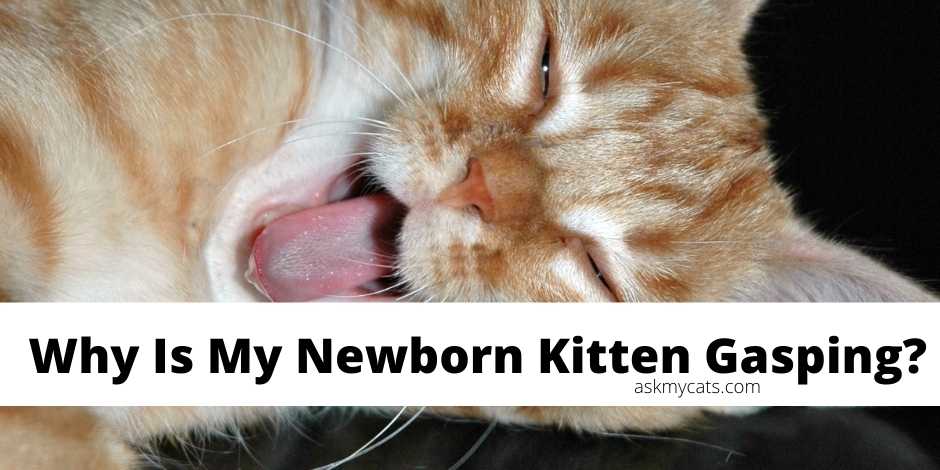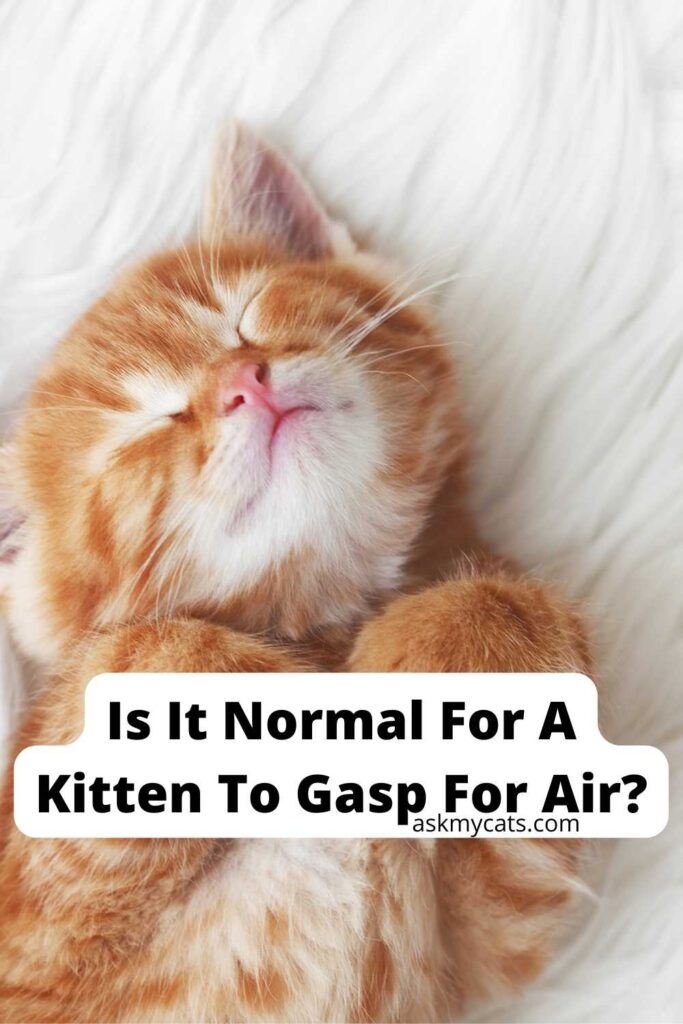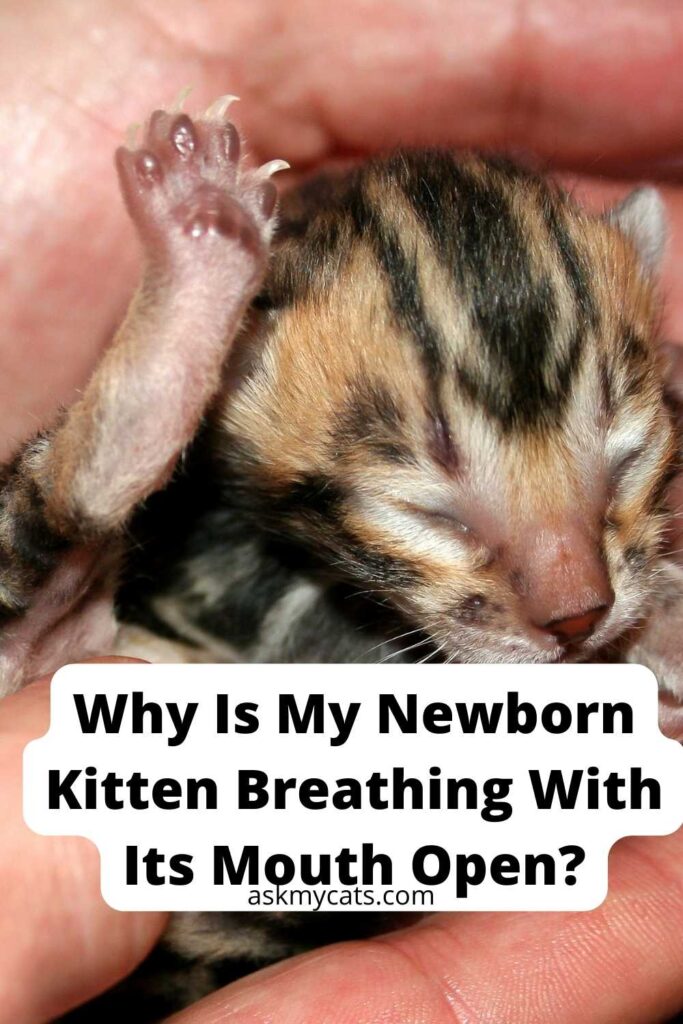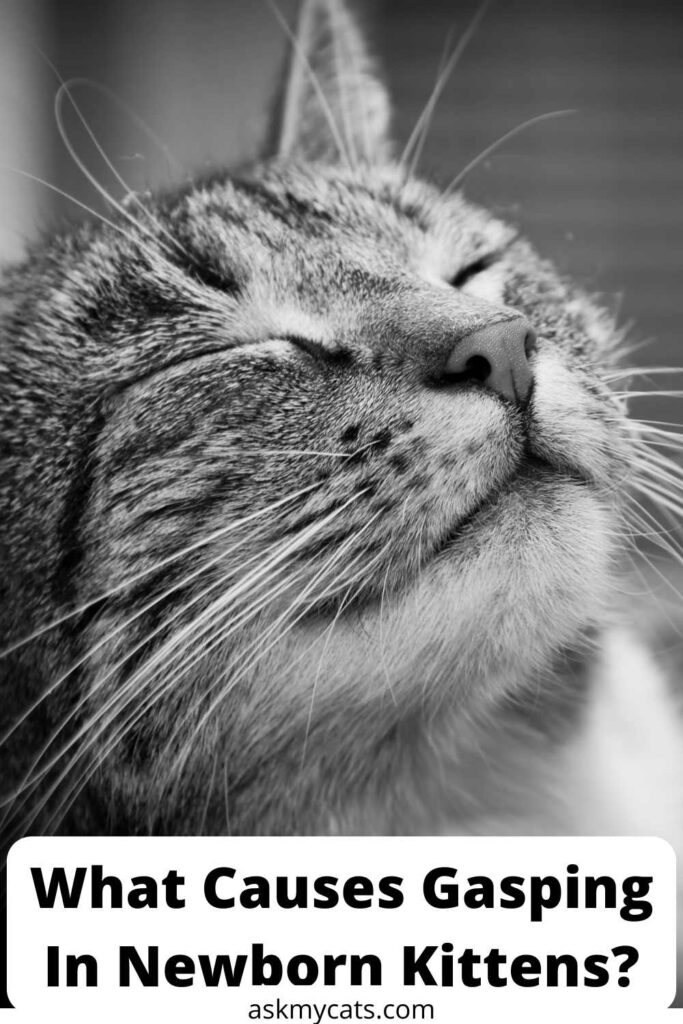If you’ve just adopted a tiny kitten from the shelter and it’s gasping, don’t panic! You may be seeing your new pet take its first breath, which is called the mewing reflex.
Newborn kittens are typically born unable to breathe independently, so this reflex allows them to draw in the air once they have made contact with the air outside of the womb.
Environmental causes, such as maternal negligence, or physical issues, such as congenital birth abnormalities, low birth weight, and anemia, can cause it. Infections of various kinds may also be a factor.
The most important thing to remember is that kittens, like newborns, are extremely vulnerable when they are born.


Give Your Cat the Perfect Day
Get the Free Ebook!
Is It Normal For A Kitten To Gasp For Air?

Yes, It’s common for newborn kittens to gasp for air shortly after birth. This usually happens in first-time mother cats or those who have not been adequately cared for.
Your kitten probably just needs a little stimulation to be able to breathe on her own without being fussy about it.
If you do not want to give a bath, using a warm damp washcloth will work.
Rub your kitten’s head and neck until she starts breathing normally and stops gasping.
My New Kitten Won’t Stop Gasping
If your newborn kitten is gasping for air and seems unable to get enough oxygen, it may be experiencing a seizure. When kittens are very young (around five days), they may suffer from hypoxic seizures, which occur when low oxygen levels impair their brains.
These seizures are often very scary to watch, especially if you’re unsure what’s happening, but they are completely normal and have nothing to worry about.
After a seizure ends, your baby will resume normal activity within 10 minutes; if it doesn’t return to normal activity after that time, contact your veterinarian.
If you see your baby has stopped breathing while sleeping or seems unresponsive at any time, immediately contact your vet by phone.
Why Is My Newborn Kitten Breathing With Its Mouth Open?

It’s normal for newborn kittens to breathe with their mouths open.
When kittens are first born, they have very little muscle strength. As a result, it takes a lot of effort to breathe through their noses.
Because of that, most newborn kittens will pant and breathe through their mouths at least some of the time until they build up enough lung strength to do it full-time.
Until then, you may notice that your kitten will still struggle in hot or humid weather; be sure your kitty has access to plenty of fresh water and shade or an air conditioner if necessary while you wait for him or her to gain more muscle strength.
You will find interesting to check out reasons behind newborn kitten panting
What To Do If A Newborn Kitten Is Struggling To Breathe
If you’ve just brought home a new furry family member and they start to struggle to breathe, don’t panic! Newborn kittens are often gagging as they learn how to suckle on their mother’s teat.
But sometimes, it can be a sign of something more serious—like an infection. If your newborn kitten seems to be struggling to take in air and keep its eyes open, go straight to your nearest veterinarian ASAP.
You must get your little one looked at as soon as possible because some infections can be treated with antibiotics before getting into their lungs or bloodstream—where treatment becomes much more difficult.
1. There Might Be An Infection Involved
When your kitten starts to gasp for air, the first thing you should do is take it to a veterinarian.
Your vet will perform an exam and try to figure out what’s wrong. In some cases, there could be a problem with your cat’s heart or lungs, which would require emergency treatment.
This can be a scary situation, but luckily kittens are much more resilient than human babies regarding respiratory problems. If your vet thinks that your kitten may need oxygen therapy (also known as hyperbaric oxygen therapy), they will help you give it at home.
The vet may even admit your kitten into an animal hospital for several days of treatment. Oxygen tanks are small enough for you to bring them home from the hospital and continue giving oxygen therapy at night until your kitty recovers.
2. There Might Be A Respiratory Problem Involved
If you have a new kitten, you’ll want to carefully monitor its breathing patterns. One of the first signs that there might be a problem is if your newborn pet starts gasping for air after being fed or during play.
If your cat looks like it’s struggling to breathe, its tongue may be lolling out of its mouth, and there may be mucus around its nose and mouth. It could also become distressed quickly because its need for oxygen can spike suddenly due to low blood sugar or infection.
It could even start vomiting if its ability to breathe adequately becomes compromised. The most common respiratory problems are usually linked with heart issues (cardiomyopathy), but asthma and lung cancer are also relatively common causes of shortness of breath in kittens.
What Causes Gasping In Newborn Kittens?

After birth, a mother cat’s body has to work hard to ensure her kittens get enough food.
During delivery, kittens are exposed to high oxytocin levels (also known as the love hormone), which causes their internal organs and digestive systems to shut down temporarily.
This also affects their breathing; they may breathe too fast or shallow.
So while they may look like they’re panting, it’s likely that it isn’t from fear or stress—they may just be having trouble drawing in a full breath until their bodies adjust post-birth.
Once they start eating regularly and begin absorbing nutrients through their skin and intestines again, you should quickly see them returning to normal.
How Can I Help My Kitten Cope With The Gasping Issue?
If your kitten is experiencing breathing issues, it can be understandably upsetting. First, note how long and often your kitten needs to gasp. You will likely be able to understand how serious their case is based on that information alone.
Take your cat to see a vet right away if you think their symptoms are chronic or even beginning to worsen over time.
The earlier they’re able to treat your kitty, the better! Discuss any home remedies with your vet to help keep things under control while you work towards determining what’s causing these symptoms.
The most common cause of surgery in a cat with breathing problems is a blockage in the airway, but it’s not the only one. When a cat has cancer, a pleural effusion (fluid or gas gathered around the lungs), or has been injured, surgery is a possibility.
Frequently Asked Questions
My Kitten Has Breathing Difficulties—Do I Need To Take Her To The Vet?
Yes, as soon as you see something is wrong, contact your vet and take your kitten to get looked at ASAP. If you have a young kitten and feel they’re struggling to breathe, it’s important to get them checked out right away. It could be something simple that can be treated right away with antibiotics or some other form of treatment in many cases. But if it turns out that your pet has a serious condition that requires further treatment to cure, they must begin treatment as soon as possible to have the best possible outcome. Don’t worry. This is a common issue, and it’s nothing to be afraid of. But the quicker you get your kitten diagnosed, the better they’ll be able to treat their condition.
My Kitten Gasped During Delivery—Does That Mean They’ll Have Breathing Issues As An Adult?
Yes, Like a human baby exposed to the umbilical cord at birth, kittens exposed to high levels of oxytocin (also known as the love hormone) can struggle with breathing for a few days after delivery. But most of them return to normal breathing patterns within a few days as their internal organs start working again.
What Are Some Possible Causes Of My Kitten’s Breathing Issues?
The most common case scenario is that your kitten has an infection in its stomach or intestines (also known as a GI infection). This is often caused by stress, which can happen if delivered too slowly or too fast. In any case, you want to ensure that whatever treatment your vet gives your kitten for the respiratory issues it’s experiencing will also help treat whatever infection or disease they have at the same time.
How Do You Give Oxygen To A Kitten?
You will need to prepare a bottle of your veterinarian’s oxytocin solution. The most common oxygen therapy used for cats is called hyperbaric oxygen therapy, or HBOT. The high-pressure treatment administered will help your kitten’s body get rid of any infections and loosen up any mucus in their lungs to make breathing easier. You’ll need to wake your kitten up every few hours or so to give it some oxygen for about 30-60 minutes. If you can’t wake your kitten, you should consider taking it to a vet to get checked out because it could signify something more serious!
What Are Some Common Treatments For Kittens With Breathing Issues?
To assist your cat to manage their disease and breathing better, antibiotics, bronchodilators, corticosteroids, and/or other drugs may be administered. If your cat’s respiratory condition is serious, your veterinarian may prescribe oxygen therapy. A hyperbaric oxygen chamber is another option used to treat breathing issues, but be sure to call your vet before your visit if it’s something you’re interested in trying.
Final Words
Caring for any animal with a chronic disease can be stressful, but kittens are particularly precious beings that bring immense joy to our lives. If your kitten is struggling to breathe, you want to get them the care they need as soon as possible.
Kittens will often have various symptoms, which can make it tough to determine what’s causing their breathing issues until you take them to a veterinarian.
But by keeping an eye on your kitten and noting where they’re struggling with breathing the most, you should be capable of determining whether or not they have a serious issue or if it’s something simpler that can be treated quickly and easily.
